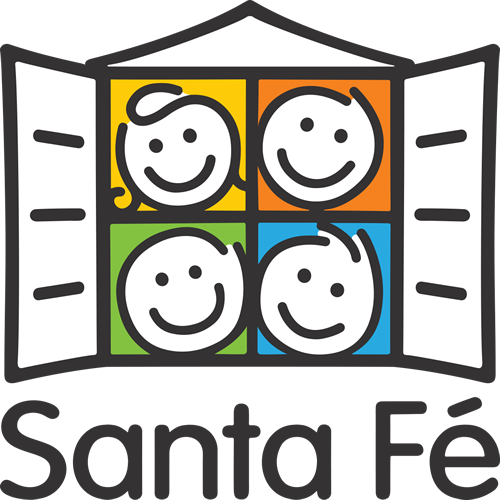Children and adolescents arrive at Santa Fé by a court judgment or referred by Conselhos Tutelares (Guardianship Councils) and the Secretaria Municipal de Assistência e Desenvolvimento Social –SMADS (Municipal Department for Social Welfare and Development) and they stay until:
- They are adopted;
- They return to their original families;
- They reach the age of 18 years or are emancipated;
Along this path, which can last until the children attain their majority, Santa Fé performs work of sheltering, following-up and treating their physical and psychological conditions. It is not enough to restore their fundamental rights such as food, health, education, leisure, professionalization, but also the right to be themselves, becoming protagonists of their own stories.
We believe that the assistance also comes from the environment around, in the set of tiny details provided on a daily basis, giving the children a new opportunity to redefine their dramatic experiences.
This is Santa Fé’s differential: enable children and adolescents to develop their full potential.
At Minha Casa, a team specially trained to deal with the most distinct traumatic situations provides all the necessary support for understanding the current situation, the social integration and individual follow-up.
In the specific case of young-mothers at Casa Vovó Ilza, specialized attention is essential so they can be cared for during their pregnancy and develop the maternal role. Their experiences, considering the family conflicts experimented did not provide them affective references. It is necessary to “mother” them, in a way to enable them to take care of their children and interrupt the painful cycle of violence experienced by all generations of their families.
In parallel to the work program developed for children and adolescents, Santa Fé also prepares their families, helping them to stabilize financially and emotionally in order to receive their children back. This is the Mudando a História/Construindo Pontes (Changing the Story) program, which includes providing house remodeling until treatment for alcoholism and drug addiction.
The systemic methodology also includes Fortalecendo Famílias (Strengthening Families) with the objective of promoting the recovery of affective, social and cultural bonds between families and the children, adolescents and young people assisted by Santa Fe.
Knowing the challenges faced during the emancipation process, Santa Fé developed a program for young people who were not reintegrated into their families, the Moradia Para Jovens Emancipados (Housing for Emancipated Young People), assisting them in the beginning of this new step of their lives.
Santa Fé believes that the bonds established with children, adolescents and their families, even after the return to their homes, must be reaffirmed. The program Educação Continuada (Continuing Education) is crucial for a systematic follow up, for at least two years, of those who have gone through our shelters. Preventing problems and supporting them in their difficulties is its main objective.
Methodology
- The child and the adolescent are the center of all action. The recognition of their stories, needs and wishes is the starting point of any intervention.
- Multidisciplinary team at the service of the child and adolescent, providing them with a safe and healthy environment, promoting their right to life and to individuality.
- The social coexistence routines are carefully implemented from large discussion with the children and adolescents, searching for an open and straight way of communication, pointing out responsibilities and limits.
- The conviviality space must be kept and perceived as a home.
- Recognition and unconditional respect of their rights, determined by the Estatuto da Criança e do Adolescente (Statute of the Child and Adolescent), highlighting the right to familiar environment.

